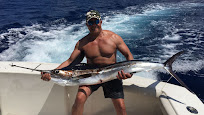Years back, I had a few discussions with my
spearo mates regarding the flashers that they used. There were many different
configurations and theories about them but the basic concept worked … and
worked well.
I decided to make my own flasher, but for ski-boat
fishing, taking into consideration the pros and cons of diving flashers.
 Since then, I have tweaked them to a point
where I am really happy with their performance. So much so that I do not fish
without them. I first made them public knowledge after a convincing win at the
St Lucia 12x12 species comp. Dorado were not very easy to come by and every day
we managed to get our numbers. Most were on the rod right next to the flasher.
Since then, I have tweaked them to a point
where I am really happy with their performance. So much so that I do not fish
without them. I first made them public knowledge after a convincing win at the
St Lucia 12x12 species comp. Dorado were not very easy to come by and every day
we managed to get our numbers. Most were on the rod right next to the flasher.
I then wanted to know how they operated from a
diver’s point of view so I gave it to a mate on the south coast. His feed back
was great. The flasher made no metallic noises, they had twice the action in
the water and on the odd occasion, the fish would swim up and actually grab the
flasher.
 I then turned my focus to the smaller billfish.
Heading to Morocco to fish for white marlin. Trolling at around 5 knots, I put
out a flasher behind a trolling weight. It swam just below the surface so that
we could see anything coming up behind it. I was pleased to see several fish
raised by it. Granted, we did also have a dredge in the water and other
teasers, but it was interesting to see how the fish would become more aggressive
around the flasher than the straight running teasers.
I then turned my focus to the smaller billfish.
Heading to Morocco to fish for white marlin. Trolling at around 5 knots, I put
out a flasher behind a trolling weight. It swam just below the surface so that
we could see anything coming up behind it. I was pleased to see several fish
raised by it. Granted, we did also have a dredge in the water and other
teasers, but it was interesting to see how the fish would become more aggressive
around the flasher than the straight running teasers.
 Here at home in local waters, I trolled two
flashers off the stern while pulling swimbaits for sailies. It worked a treat, not
only for sails and dorries, but also for the small 20 to 40kg black marlin.
Here at home in local waters, I trolled two
flashers off the stern while pulling swimbaits for sailies. It worked a treat, not
only for sails and dorries, but also for the small 20 to 40kg black marlin.
 This December, I tried it while live baiting
for marlin. We had a live bonito swimming on the starboard side and the flasher
on the port stern cleat. I’m not sure if it brought the fish in, but we caught a
black marlin for out efforts. What was interesting is that a big hammerhead
came up to look at the 5 flasher blades before it spotted the lone bonnie. This
gave us time rip the bait in and save it.
This December, I tried it while live baiting
for marlin. We had a live bonito swimming on the starboard side and the flasher
on the port stern cleat. I’m not sure if it brought the fish in, but we caught a
black marlin for out efforts. What was interesting is that a big hammerhead
came up to look at the 5 flasher blades before it spotted the lone bonnie. This
gave us time rip the bait in and save it.
I have been lucky to play around with different
methods to incorporate these flashers into my fishing and now use them when slow
trolling for gamefish, on the surface and on the downrigger, when fishing for
sailfish, off the riggers and in the small dredges I make and when drifting.
They are surprisingly versatile and I will not be caught without them.
If anyone is interested in buying a set or two, drop me a comment with your email address and I can send you the prices.
Below are some of the many fish taken with the flashers.







That sounds real great in interested
ReplyDeleteIf interested, send me am email to kcrbs7@gmail .com
DeleteThis comment has been removed by the author.
DeleteFor the email address, please remove the space. Should be @gmail.com
ReplyDeleteThanks for the great response on the flashers. Seems like everyone is gearing up for the dorado season. For those who haven't bought one yet, enjoy watching the other boats catch them ;)